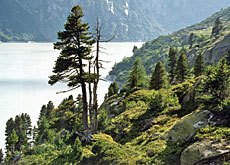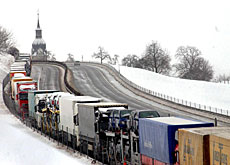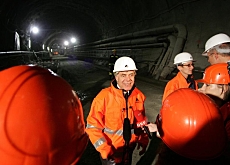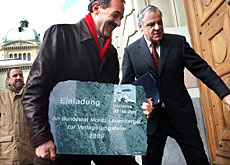EU steers traffic away from alpine regions

The European Union's transport ministers have voted to ratify the alpine Convention protocol aimed at protecting the Alps from increasing road traffic.
After years of negotiations, all nine parties to the treaty have signed on, but four countries – including Switzerland – have yet to decide on ratification.
The ministerial decision on Thursday in Luxembourg now means that the EU is committed to a sustainable transport policy within the alpine area. This involves not building new multi-lane roads through the Alps, more cost effective transport and less pollution.
The EU will also have to work out an arrangement regarding transalpine goods traffic that is acceptable to the alpine nations.
Thursday’s agreement means all nine parties (the eight Alpine countries from Monaco to Slovenia plus the EU) have signed the treaty, but only Austria, Germany, Liechtenstein, Slovenia and France have so far ratified it.
Switzerland, which has consistently demanded a regional policy for sustainable alpine traffic, has still to get around to ratification, despite signing the convention six years ago.
Ratification demanded
On Thursday non-governmental groups the Alpine Initiative and the International Commission for the Protection of the Alps (Cipra) called on the Swiss government to press ahead with ratifying the treaty.
The House of Representatives is set to discuss the issue during its next session in November, but it is uncertain whether any decisions will be reached.
The Alpine Initiative says the authorities should increase efforts to promote new safety measures for trucks travelling through the Gotthard road tunnel in central Switzerland, which is the main north-south axis between Germany and Italy.
Transport Minister Moritz Leuenberger recently suggested delaying until 2017 the target date for halving the number of heavy-goods trucks crossing the Alps.
The Alpine Initiative maintains thought that it is still possible to meet the target date of 2009 for reducing the number of heavy-goods vehicles from 1.25 million to 650,000 per year.
swissinfo with agencies
The aims of the Alpine Convention are the protection and sustainable development of the Alps with preservation and use also taken into account.
The agreement consists of a framework convention with protocols regarding: land-use planning and sustainable development, conservation of nature and landscapes, agriculture, forestry, tourism and recreation, soil conservation, energy and transport.
Further protocols cover population and culture, prevention of air pollution, water management and waste management.
Railways account for 16% of Europe’s goods transport, while roads handle 72%.
In 2003, 1.3 million trucks crossed the Swiss Alps.
The current traffic law states that by 2009 only half as many crossings (650,000) will be permitted.
An existing tax on heavy goods vehicles is aimed at moving freight from the roads onto the rails.

In compliance with the JTI standards
More: SWI swissinfo.ch certified by the Journalism Trust Initiative



You can find an overview of ongoing debates with our journalists here. Please join us!
If you want to start a conversation about a topic raised in this article or want to report factual errors, email us at english@swissinfo.ch.